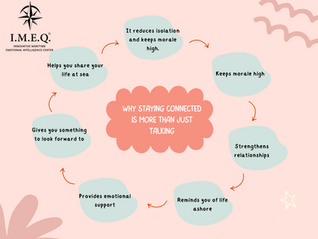Managing Anxiety and Recognizing Stress at Sea
- IMEQ CENTER

- Jan 11, 2024
- 4 min read

Working as a seafarer can be a rewarding but challenging profession. Being away from loved ones, dealing with unpredictable weather, and handling complex machinery can all contribute to stress and anxiety onboard. In this article, we will explore some practical tips on how to maintain low anxiety levels while at sea and recognize when stress is affecting your physical health.
Establish a Routine:
One of the most effective ways to reduce anxiety onboard is to establish a daily routine. Predictable schedules can help create a sense of stability and control. Make sure you allocate time for meals, exercise, rest, and leisure activities. A well-structured day can make your life at sea more manageable.
Stay Connected:
Isolation can exacerbate anxiety. Stay in touch with family and friends through emails, phone calls, or video chats when possible. Sharing your experiences and feelings with loved ones can provide emotional support and help alleviate stress.
Maintain a Healthy Lifestyle:
A balanced diet and regular exercise are essential for both your mental and physical well-being. Stock up on nutritious food options, and try to incorporate physical activity into your daily routine, even if it's just a short walk on the deck. Avoid excessive consumption of caffeine and alcohol, as they can contribute to anxiety and negatively impact your health.
Manage Workload and Time:
Overloading yourself with tasks can increase stress levels. Prioritize your work and communicate with your colleagues and superiors if you are feeling overwhelmed. Effective time management and teamwork can help distribute the workload more evenly, reducing stress for everyone onboard.
Practice Relaxation Techniques:
Learn and use relaxation techniques to manage anxiety. Deep breathing exercises, meditation, and mindfulness can be helpful tools for staying calm in challenging situations. Take a few minutes each day to practice these techniques and relieve stress.
Identify Early Signs of Stress:
It's important to recognize the early signs of stress before they become overwhelming. Some common signs include trouble sleeping, irritability, muscle tension, and changes in appetite. When you notice these symptoms, take action to address your stress promptly.
Seek Support:
Don't hesitate to reach out for support if you're feeling overwhelmed. Many maritime companies offer counseling services or have trained professionals who can help you cope with stress and anxiety. Speaking to a mental health expert or your onboard medical officer can provide valuable insights and strategies.
Monitor Your Physical Health:
Stress can have a significant impact on your physical health. Be attentive to any physical symptoms such as headaches, digestive issues, or chest pain. If you notice any unusual or persistent symptoms, consult the onboard medical personnel for a thorough check-up.
Take Breaks and Rest:
Regular breaks and adequate rest are crucial for maintaining your mental and physical health. Fatigue can amplify stress, so make sure to get enough sleep and take short breaks during your workday to recharge.
Maintaining low anxiety levels while working at sea is essential for your overall well-being. By establishing a routine, staying connected with loved ones, and adopting healthy habits, you can reduce stress and anxiety levels. Additionally, recognizing the early signs of stress and seeking support when needed can make a significant difference in managing your mental and physical health while onboard. Prioritizing self-care will help you sail smoothly through your seafaring career.
ONLINE RESOURCES
There are several applications and digital resources that can help seafarers manage stress, anxiety, and overall mental well-being while onboard. Here are some examples:
Calm and Headspace: These popular meditation and mindfulness apps offer guided meditation sessions and relaxation techniques to reduce stress and promote relaxation.
MyShiftPlanner: This app helps seafarers track their work schedules, manage their shifts, and plan their time off more effectively, allowing for better work-life balance and reduced stress.
Moodfit: Moodfit is a mood tracking app that allows you to monitor your emotional well-being over time. It provides tools for self-reflection and offers suggestions on how to improve your mood.

Other resources:
Virtual Mental Health Resources: Some maritime companies and organizations offer virtual mental health resources and telehealth services that allow seafarers to connect with mental health professionals via video calls while at sea.
Maritime Safety Apps: Some maritime safety apps include features related to stress and mental health, such as safety tips and information about managing stress during emergencies or challenging situations at sea.
Mindfulness and Relaxation Podcasts: If you have limited internet access, consider downloading mindfulness and relaxation podcasts before your voyage. These can provide valuable guidance on relaxation techniques.
Language Learning Apps: Learning a new language can be a productive way to pass the time and keep your mind engaged during long voyages. Apps like Duolingo or Rosetta Stone can be both educational and enjoyable.
Reading and Audiobook Apps: Having access to a digital library of books and audiobooks can be a great way to unwind and escape into a different world during your downtime.
Fitness and Exercise Apps: Staying physically active is essential for reducing stress. Fitness apps can provide workout routines and exercises that can be done in limited space on a ship.
Navigation and Weather Apps: Having up-to-date navigation and weather apps can help you anticipate and navigate challenging conditions, reducing anxiety related to weather and navigation.
Remember to check the availability of these apps and resources before your voyage and ensure that you have access to the necessary devices or internet connectivity. Additionally, consult with your maritime company or organization to see if they provide any specific mental health or well-being resources or recommendations for seafarers.





































































































Comments